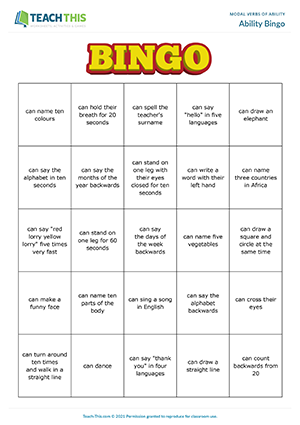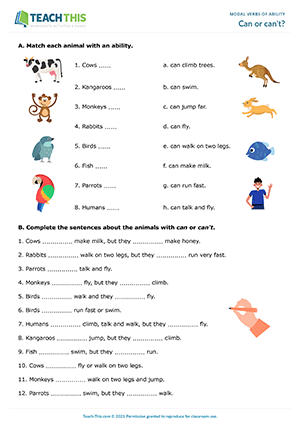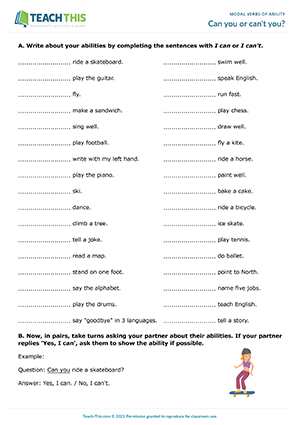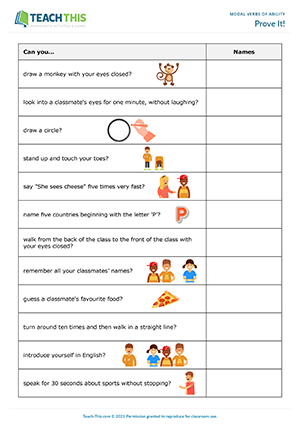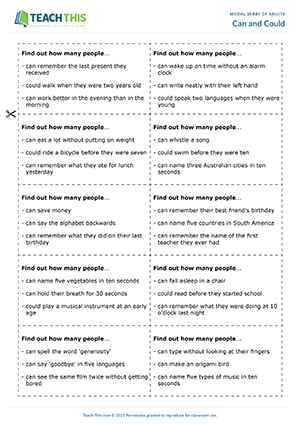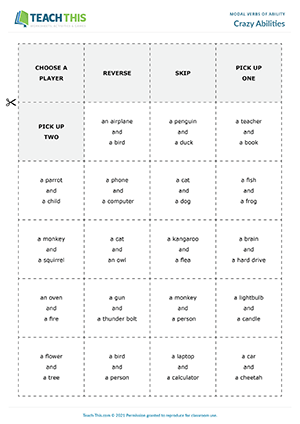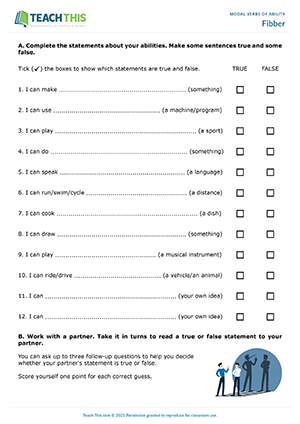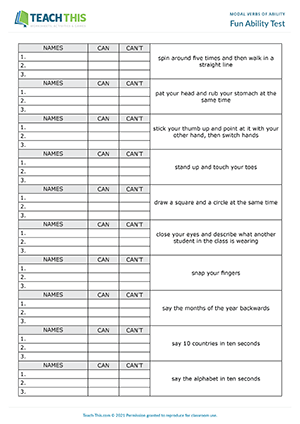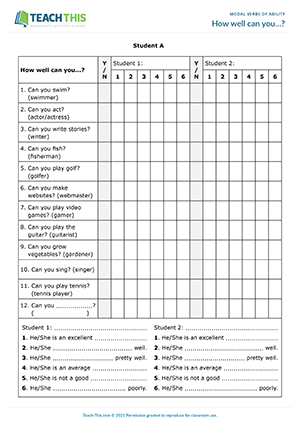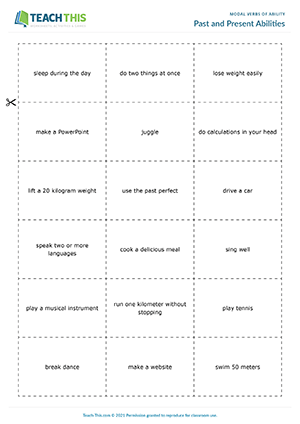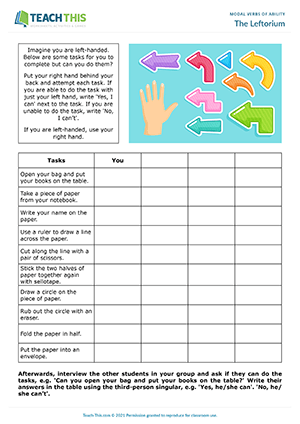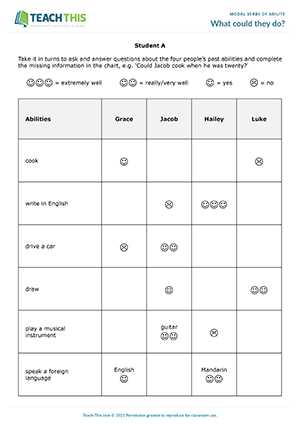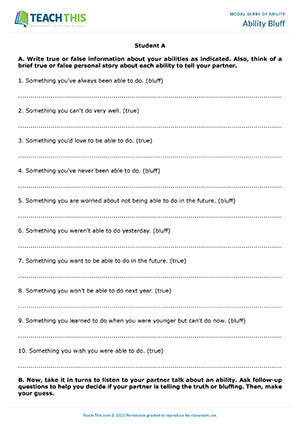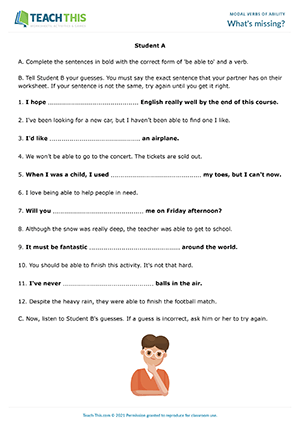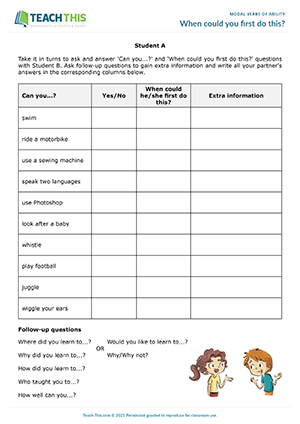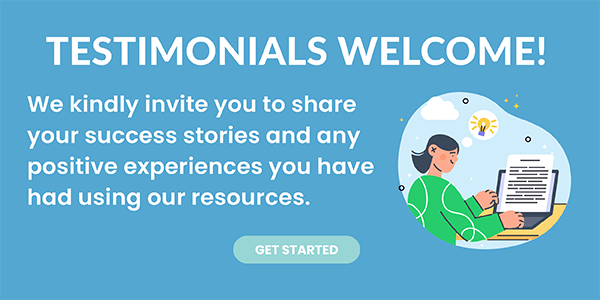Modal Verbs of Ability ESL Activities, Games and Worksheets
In this free Can you...? game, students play bingo by finding classmates who have certain abilities. Students go around the classroom asking Can you...? questions in order to find classmates who have the abilities shown on their bingo card, e.g. 'Can you name ten colours?' When a student finds someone who answers Yes, I can, the student asks the person to demonstrate their ability by performing the task. If the person can demonstrate the ability, the student writes their name in the square on the bingo card and then moves on to talk to another person. The first student to get five names in a row shouts 'bingo' and everyone stops. Check the answers by asking the five students to perform their abilities to the class. If they do this successfully, the student wins the game.
In this useful can or can't worksheet, students learn and practice the modal verbs of ability can and can't. Students begin by matching each animal with a corresponding ability. Next, students complete sentences about the animals with can or can't. After that, students write true sentences about themselves with can or can't using the verbs from the first page. In the last exercise, students correct mistakes in can and can't sentences and rewrite them.
This productive can and can't worksheet helps to teach students how to talk about their abilities. First, students write about their abilities by completing sentences on the worksheet with I can or I can't. In pairs, students then take turns asking about their partner's abilities by asking questions with Can you...?, e.g. 'Can you ride a skateboard?' Their partner replies Yes, I can or No, I can't accordingly. If their partner replies 'Yes, I can', the student asks their partner to demonstrate the ability if possible.
In this fun can and can't game, students guess whether a partner can or can't do certain things and ask Can you...? questions to find out if their guesses are right or wrong. Working alone, students guess whether their partner can or can't do the things listed on their worksheet by circling can or can't in each sentence. Students then take it in turns to find out if their guesses are right or wrong by asking their partner Can you...? questions, e.g. 'Can you spell the teacher's full name?' Students put a tick or cross in the last column on the worksheet, depending on whether their guess was right or wrong. If possible, students ask their partner to demonstrate their ability. The student with the most correct guesses wins the game. Afterwards, students tell the class about their partner, e.g. 'I talked to Pam. She can spell the teacher's full name, but she can’t play the piano, etc.'
In this amusing can and can't speaking activity, students try to complete mind-body coordination tasks, body teasers and fun speaking exercises to prove their abilities. Students move around the classroom asking Can you...? questions from the prompts on the worksheet, e.g. 'Can you draw a monkey with your eyes closed?' When a classmate answers 'Yes, I can', the student asks them to prove their ability. If the classmate can complete the task, the student writes down their name. When everyone has finished, invite students to demonstrate their abilities to the class.
In this free can and could speaking activity, students find out about their classmates' past and present abilities. Students go around their group finding out about their classmates' past and present abilities according to the task on their card by asking questions with Can you...? and Could you...? Students put a tick on the back of the card each time a classmate answers 'Yes, I can' or 'Yes, I could'. If possible, the classmate should also prove their ability by completing the task on the card. When everyone has finished, students sit down in their groups and take it in turns to talk about the information they found out. Afterwards, students give feedback to the class on their findings.
This engaging modal verbs of ability game is based on the card game Crazy Eights. In the game, students say what ability or skill two things have in common using the modal verb can. The first player chooses one of their cards, lays it on the table, and directs a question to the second player, e.g. 'What can a penguin and a duck do?' If the second player gives an acceptable answer (e.g. They can both swim.), they lay down a card and direct a question to the third player. If the answer is not accepted, then the second player is not allowed to lay down a card, but the third player is. The game proceeds from there. The first player to lay down all their cards wins the game.
In this humorous can and can't activity, students play a true or false guessing game about their abilities. First, students complete statements on their worksheet with true and false information about their abilities. In pairs, students then take it in turns to read out a true or false statement about their ability. Their partner asks up to three follow-up questions to help them decide whether the student's statement is true or false. Their partner then makes their guess and the student reveals the answer. Students score one point for each correct guess. The student with the most points at the end of the game wins.
Here is an entertaining can and can't activity in which students try to complete various challenges and fill in a chart to show what members of their group can and can't do. In groups of three, students write their names next to the first challenge on the worksheet and then take it in turns to try to complete the challenge. Students put a tick in the can or can't column next to their name, depending on whether they completed the task successfully or not. Students then repeat the procedure for the other challenges and complete the chart. Finally, students write a summary of what their group can and can't do and read it to the class.
In this insightful can and can't speaking activity, students practice talking about skills and levels of ability using modal verbs and adverbs of manner. In pairs, students take it in turns to ask their partner Can you...? questions and mark their responses on the worksheet. When their partner replies 'Yes, I can', the student asks a How well can you...? question. Their partner responds with one of six phrases on the board that express their level of ability, and the student ticks the appropriate 1 to 6 box on the worksheet. When everyone has finished, students form new pairs and ask and answer questions about their new partner’s former partner using the third person singular. Students then complete sentences on the worksheet with information about the students' levels of ability.
In this enjoyable can and could speaking activity, students play a true or false guessing game about past and present abilities. In groups, students take it in turns to pick up a card and use the prompt on the card to ask a question to the other students about a past or present ability. For example, if the prompt read 'sleep during the day', the student might ask 'Can you sleep during the day?' or 'Could you sleep during the day when you were a child?' The other students can either give a true or false answer. The student with the card then asks follow-up questions to work out if the other students are lying or telling the truth. The student then makes a guess for each group member and the correct answers are revealed. For each correct guess, the student scores a point. The student with the most points at the end of the game wins.
In this interesting modal verbs of ability speaking activity, students try completing certain tasks with their left hand. Students then ask and answer questions about their left-handed abilities using can and can't. Students imagine that they are in the Leftorium with Ned Flanders from the Simpsons and that they have been given some tasks to do using only their left hand. In groups, students then put their right hand behind their back and attempt each task on the worksheet in turn. If students are able to do the task with their left hand, they write 'Yes, I can' next to the task. If students are unable to do the task, they write 'No, I can’t'. When everyone has finished, students interview the people in their group and ask questions about their ability to do the tasks. Students write their classmates' answers on the worksheet using the third-person singular. Afterwards, students give feedback to the class on the tasks they can and can't do.
In this rewarding could and couldn't speaking activity, students ask and answer questions about four people’s past abilities using could, couldn't and adverbs of degree. Each student looks at information in a chart on their worksheet about what four people could do and how well when they were twenty. In pairs, students then take it in turns to ask and answer questions about the four people’s past abilities and complete missing information in the chart. Afterwards, students write a paragraph about what they could do at a certain age.
In this free be able to game, students practice modal verbs of ability and expressions with be able to. In two groups, students complete true and false information about their abilities as indicated on their worksheet. Students also think of a brief personal story about each ability to tell a partner. Students then pair up with someone from the other group and take it in turns to talk about an ability and tell a story. Their partner's task is to listen and ask follow-up questions to help them decide if the student is telling the truth or bluffing. Their partner then makes their guess and the student reveals the answer. Students score one point for each correct guess. The student with the most points at the end of the game wins. Afterwards, students report back to the class on the best bluffs.
In this memorable be able to activity, students complete sentences with the correct form of be able to and a verb. One student begins by reading the first sentence to their partner, adding in the appropriate form of be able to and verb. The student must say the exact sentence that their partner has on their worksheet. If the guess is correct, the student moves on to the next sentence. If not, they try again. When the student has completed all the sentences correctly, the two students swap roles. Afterwards, pairs discuss how they would reply to each sentence.
In this compelling can and could speaking activity, students ask and answer questions about present and past abilities. In pairs, students take it in turns to ask their partner a Can you...? question from their worksheet. If their partner replies 'Yes, I can', the student finds out when they were first able to do the ability by asking When could you first do this? Their partner replies and the student asks suitable follow-up questions from the worksheet to gain extra information. The student writes all their partner's answers in the appropriate columns on their worksheet. If their partner replies 'No, I can't' to the first question, the student asks a Would you like to...? question and notes down their partner's answer. Students continue taking it in turns to ask and answer questions until both worksheets have been completed. Afterwards, students give feedback to the class on what they found out about their partner.



